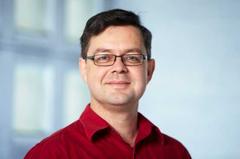Matthias Troyer. Image: ETH, Giulia Marthaler
This year, the Hamburg Prize for Theoretical Physics goes to the Austrian physicist Matthias Troyer. He receives the award, which is worth 137,036 euros, at a symposium in the Hamburg Planetarium today for his work on simulations of strongly correlated quantum systems and the development of novel algorithms. The Hamburg Prize for Theoretical Physics has been awarded every year for ten years by the Joachim Herz Foundation together with the Wolfgang-Pauli-Centre (WPC) of DESY and the University of Hamburg as well as the Cluster of Excellence "CUI: Advanced Imaging of Matter" of the University of Hamburg.
Troyer is professor at ETH Zurich and also works in quantum research at the software giant Microsoft. He develops so-called quantum Monte Carlo algorithms. Based on random numbers, these algorithms can be used to predict how tiny particles in quantum mechanical multi-particle systems - for example atoms or molecules - influence each other. Troyer is thus making significant contributions to basic research and to the further development of quantum computers and superconducting materials.
"Matthias Troyer's work is closely related to central research priorities at the WPC and the whole campus," says DESY theorist and jury chairman Volker Schomerus. "The contact with him will not only provide very interesting impulses for several groups in theoretical physics, but will also promote the exchange between theory and experiment, which is a central concern of the WPC."
Troyer was nominated by Robert Feidenhans'l of the European XFEL and Alexander Lichtenstein of the University of Hamburg. The European XFEL has a strong interest in a collaboration with Matthias Troyer. The prize is also associated with research stays in Hamburg, during which Troyer will give lectures and work intensively with doctoral students, postdocs and colleagues.
Troyer's research focuses on the interface between computer science and theoretical physics. He has developed new computer algorithms with which he could understand the behavior of many strongly interacting quantum systems. His research has included quantum magnets, superfluid crystals, atomic gases, and exotic materials such as graphene. The investigation of quantum multi-particle systems led him to work with quantum computers, which are expected to have a much higher computing power than conventional computers.








